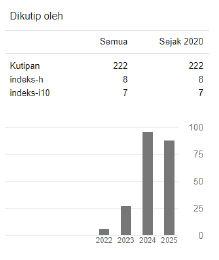The Impact of Edutech Utilisation on Mathematics Learning Outcomes
 https://doi.org/10.54012/ijcer.v4i1.628
https://doi.org/10.54012/ijcer.v4i1.628
 Abstract views: 153
Abstract views: 153
 PDF downloads: 117
PDF downloads: 117
Keywords:
Edutech, Digital Learning, Public Schools, Private Schools, Learning OutcomesAbstract
This study aimed to analyse the differences in the utilisation of educational technology (Edutech) in mathematics learning between public and private schools in South Lampung Regency and its impact on students’ learning outcomes. The research background lies in the gap in digital infrastructure, teachers’ competence, and school management support that affect the optimisation of Edutech. A mixed-methods approach was employed with a descriptive qualitative and quantitative design. Quantitative data were obtained through mathematics achievement tests conducted in six sample schools representing both public and private institutions, while qualitative data were collected through teacher and headmaster interviews as well as student perception surveys. The findings reveal that private schools, particularly well-established ones, consistently integrate Learning Management Systems and interactive applications, whereas public schools still encounter obstacles such as limited devices and unstable internet access. These differences affect student achievement, with private school students generally scoring higher than their public school counterparts. The study concludes that Edutech contributes positively to mathematics learning outcomes, although its successful implementation strongly depends on policy support, facilities, and the readiness of teachers and students.
Downloads
References
H. S. Al-zboon, A. M. Gasaymeh, and M. S. Al-Rsa’i, “The attitudes of science and mathematics teachers toward the integration of information and communication technology in their educational practice: The Application of the Unified Theory of Acceptance and Use of Technology (UTAUT),” World Journal of Education, vol. 11, no. 1, pp. 75–90, 2021.
D. P. Ausubel, Educational psychology: A cognitive view. New York, NY: Holt, Rinehart and Winston, 1968.
F. D. Davis, “Perceived usefulness, perceived ease of use, and user acceptance of information technology,” MIS Quarterly, vol. 13, no. 3, pp. 319–340, 1989.
E. L. Deci and R. M. Ryan, Intrinsic motivation and self-determination in human behavior. New York, NY: Springer, 1985.
S. Deterding, D. Dixon, R. Khaled, and L. Nacke, “From game design elements to gamefulness: Defining ‘gamification,’” in Proc. 15th Int. Academic MindTrek Conf.: Envisioning Future Media Environments, 2017, pp. 9–15, ACM.
D. Elpana, R. Riswandi, and H. Fitriawan, “Tantangan implementasi blended learning di sekolah menengah Lampung,” Jurnal Teknologi Pendidikan, vol. 25, no. 2, pp. 77–89, 2023.
S. Ernawati, N. Nurwahidin, and R. Riswandi, “Pelatihan guru dalam pemanfaatan media pembelajaran berbasis teknologi untuk meningkatkan peran fasilitator,” Jurnal Pendidikan Matematika, vol. 16, no. 1, pp. 45–58, 2022.
A. Farhan and I. G. Sudatha, “Multimedia interaktif berbasis realistic mathematics education untuk meningkatkan pemahaman konsep matematika,” Jurnal Edutech, vol. 12, no. 2, pp. 101–115, 2023.
M. Fitrah, A. Setiawan, R. Widihastuti, Y. Marinding, and A. Herianto, “Infrastruktur dan pelatihan guru sebagai faktor penentu keberhasilan integrasi teknologi digital di Indonesia timur,” Jurnal Inovasi Pendidikan, vol. 8, no. 1, pp. 55–69, 2024.
H. Julianto, A. Efendi, and G. Gunarhadi, “Pengembangan ethnomatematika berbasis Android untuk pembelajaran geometri di sekolah menengah,” Jurnal Riset Pendidikan Matematika, vol. 11, no. 1, pp. 34–47, 2024.
T. S. Melinda, E. Partasiwi, and K. Kirana, “Penggunaan aplikasi Android dalam pembelajaran matematika di SMP Negeri 13 Bandar Lampung,” Jurnal Pendidikan Matematika, vol. 15, no. 2, pp. 88–97, 2022.
R. Noviyanti, I. Sugiharta, and F. Farida, “Blended learning berbasis Edmodo untuk meningkatkan kemampuan pemecahan masalah matematis siswa,” Jurnal Pendidikan Matematika UIN Raden Intan Lampung, vol. 10, no. 2, pp. 121–134, 2021.
J. Piaget, The psychology of the child. New York, NY: Basic Books, 1972.
A. Prasetyo and R. Nugroho, “Kualitas infrastruktur teknologi sekolah dan pengaruhnya terhadap hasil belajar siswa,” Jurnal Pendidikan Indonesia, vol. 7, no. 3, pp. 201–213, 2021.
N. Rahma and E. Nurlaelah, “Dampak teknologi digital terhadap pencapaian matematika siswa di Indonesia: Sebuah meta-analisis,” Jurnal Pendidikan Matematika, vol. 17, no. 1, pp. 23–39, 2023.
F. Rahmawati, “Pelatihan guru dalam pengembangan pembelajaran berbasis teknologi,” Jurnal Teknologi dan Pembelajaran, vol. 10, no. 2, pp. 66–78, 2022.
R. Rahmadhani, “Pengembangan e-modul interaktif berbasis etnomatematika Lampung untuk materi bangun ruang sisi datar,” Jurnal Pendidikan dan Kebudayaan, vol. 7, no. 2, pp. 142–156, 2022.
F. Rahmawati, K. Kirana, and E. Partasiwi, “Efektivitas GeoGebra dalam pembelajaran matematika SMA di Bandar Lampung,” Jurnal Inovasi Pendidikan Matematika, vol. 14, no. 3, pp. 98–110, 2023.
E. M. Rogers, Diffusion of innovations, 5th ed. New York, NY: Free Press, 2003.
D. A. Sari and R. Dewi, “Pengaruh penggunaan teknologi dalam pembelajaran matematika terhadap kemampuan berpikir kritis siswa,” Jurnal Riset Pendidikan, vol. 12, no. 1, pp. 77–86, 2020.
J. Setälä, N. Heilala, E. Sikström, and T. Kärkkäinen, “Adoption of generative AI in mathematics education: A diffusion of innovations perspective,” Journal of Educational Research, vol. 118, no. 2, pp. 145–161, 2025.
L. S. Vygotsky, Mind in society: The development of higher psychological processes. Cambridge, MA: Harvard University Press, 1978.
B. Yildirim, O. Bektas, and A. Erdem, “Preservice mathematics teachers’ intention to use technology: An application of the Technology Acceptance Model,” International Journal of Education in Mathematics, Science and Technology, vol. 9, no. 3, pp. 411–426, 2021.
R. Yunita and I. Wardani, “Persepsi guru terhadap manfaat teknologi dalam pembelajaran matematika,” Jurnal Pendidikan Matematika Indonesia, vol. 4, no. 2, pp. 56–65, 2019.
Downloads
Published
How to Cite
Issue
Section
License
Copyright (c) 2025 Nabila Nurhaliza Ali

This work is licensed under a Creative Commons Attribution-ShareAlike 4.0 International License.









